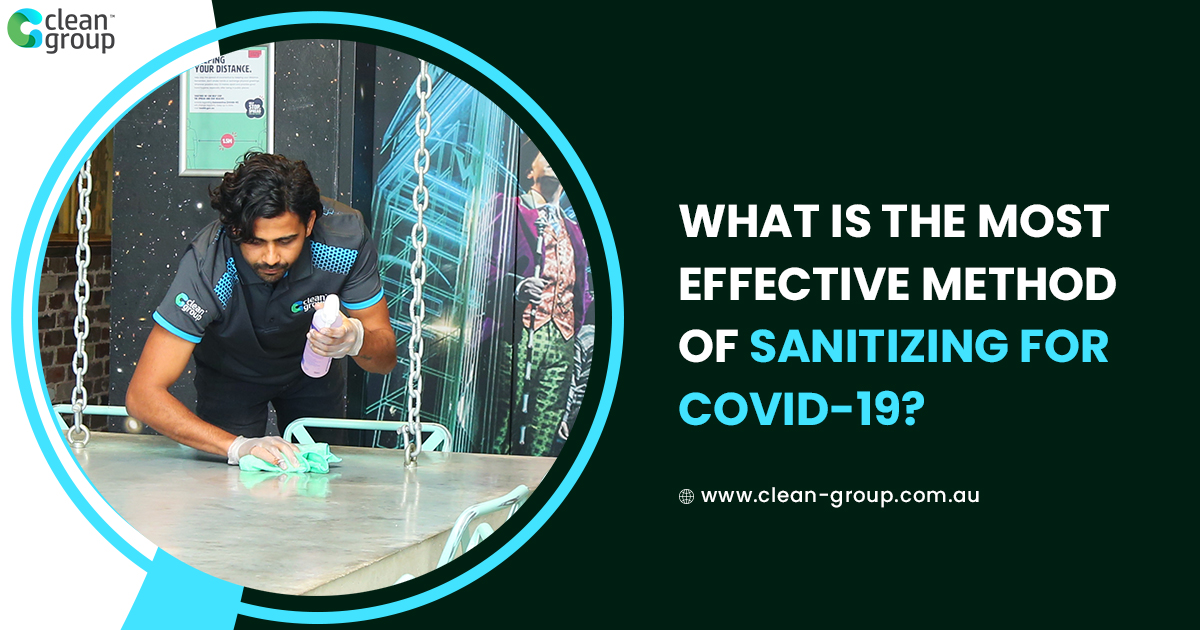COVID is a very real threat, not just to people but also to businesses and companies. As seen in the last year or so, many small businesses had to close their doors permanently and others failed to recover from the impacts of the coronavirus. So, it would be wise to not take the threat lightly. Let’s talk about the best ways to sanitize to get rid of the virus responsible for COVID-19 cleaning.
What Is Covid Sanitization?
Sanitization refers to the process of making something sanitary using a specialised chemical called sanitizer. Basically, the application of a sanitizer will remove or reduce pathogens such as bacteria on a surface.
This is particularly used for Covid deep cleaning services in sensitive premises including food processing and medical industries where sanitation is a mandatory requirement.
Sanitizing should not be confused with disinfecting, which is a more effective method of control infection and bacteria on hard, non-porous surfaces. Disinfecting generally involves the use of a more harsh chemical that may not always be suitable for medical and food premises and for personal use.
Sanitization is also used for laundry and other soft surfaces to remove germs and bacteria from them. Sanitizer may also refer to hand sanitizer, which is an ethanol-based solution generally used to clean hands and get rid of bacteria and germs. Alcohol-based sanitizers containing at least 60% alcohol have been found to be effective against the coronavirus.
Best Methods for Covid Sanitizing
Sanitizing provides an additional layer of security after cleaning for equipment and surfaces on which disease-causing organisms may be present. The use of an effective sanitizing solution and procedure can help reduce germs on common surfaces as well as hands, which in turn, helps prevent the transfer of these germs to other surfaces or people.
COVID Sanitizing is particularly helpful in industrial and commercial premises where sanitation is a mandatory concern because of dealing with foods and people’s safety (medical premises). The process helps remove a variety of microorganisms, including the coronavirus, from food-contact surfaces, utensils, and equipment.
In hospitals and medical premises, sanitization is a mandatory practice before and after the use of medical equipment and devices. It is known to be effective against the COVID-19 virus.
In general, there are two proven methods of sanitizing used in both commercial and industrial premises for providing final sanitation after the surface or object has been cleaned properly. These include – 1) Heating & 2) Chemical Treatment.
1) Sanitization by Heating
The use of hot water and/or steam is a very common household sanitization process. This method is particularly useful for removing germs from foods and food-contact surfaces such as utensils, bottles, etc. Heating at a certain temperature can help reduce or kill the COVID-19 virus.
Hot water sanitizing: The use of hot water for sanitizing is both easy and very effective. There are other benefits as well, such as hot water is readily available, non-toxic and affordable.
The sanitizing process involves either immersing the object into hot/boiling water or pumping the water onto the surface/object. The ideal water temperature for effective hot water sanitizing is 171°F. (77°C) or above.
Steam sanitization: This method of sanitizing by heating involves the use of steam, which is also a wonderful agent for removing germs from food equipment and items.
This method is both safe and very effective in food equipment sanitization. The process involves treating the object with the steam flow at 171°F. (77°C) for at least 15 minutes or above 200°F for at least 5 minutes.
2) Sanitization by Chemicals
The use of chemical solutions is one of the best and quick ways to get rid of germs and disease organisms, including the coronavirus from surfaces and hands. The chemicals used for the sanitizing purpose must have specific properties and be approved by respective authorities for the ability to destroy microorganisms.
Some chemicals may not be suitable for use on food-contact surfaces because of their harsh properties, in which case hot water or steam sanitizing is recommended. For all other industrial and commercial sanitizing needs, using an approved sanitizer is ideal.
Only TGA-approved chemicals and sanitary products that are certified to remove the COVID-19 virus must be used for professional sanitizing in industrial and commercial premises.
When buying or using a sanitizer, make sure to check the label for instructions to use, registration number, preferred uses, and safety precautions. For both household and industrial sanitizing needs, the following chemical sanitizers are safe to use:
1. Chlorine: Chlorine and its compounds are a part of a number of popular sanitizer and disinfectant products. Chlorine can help remove a wide variety of microorganisms from surfaces and water. It doesn’t leave stains and is effective even in hard water. It’s also affordable and easily available.
2. Iodophors: These are soluble iodine complexes usually combined with other nonionic surface cleaning agents. These are effective in the removal of bacteria and are non-corrosive and don’t leave stains. Also, it’s safe for the skin.
3. Ammonium Compounds: are surface cleaning agents that are able to remove a wide variety of germs. These are non-corrosive, skin-friendly, and stable. The application of the solution on a surface will form a protective film, thereby preventing further contamination.
Make sure to check the label and confirm with the vendor/manufacturer whether the sanitizer is effective against the coronavirus before purchasing and using it. Also, one must consider the different factors affecting the effectiveness of chemical sanitizers.
Most of the sanitizer products/chemicals work on contact, which means they must come in direct contact with microorganisms in order to destroy them.
Also, certain sanitizers may be selective in which variety of microorganisms they work on. The concentration of the sanitizer is another thing one needs to look at when buying it.
The more concentrated the sanitizer, the more effective it will be to remove germs. The temperature of the sanitizer solution, pH of sanitizer, and time of exposure are some other factors to consider when choosing the right sanitizer solution for COVID cleaning.
Covid Sanitizing by Professional Cleaners
As the demand for specialist COVID cleaning and sanitizing services is increasing, so is the number of professional cleaning companies offering these services.
Hiring a professional commercial cleaner in Sydney is certainly the best way to ensure complete sanitation in commercial premises. Clean Group offers complete COVID cleaning, sanitizing, and disinfecting services at affordable prices.
The cleaning professionals will perform routine cleaning as well as sanitize all high-traffic areas and surfaces such as countertops, tables, light switches, toilets, doorknobs & handles, rails, chairs, faucets, refrigerator doors, remote controls, etc.
All food-contact surfaces, including dishwashers, utensils, kitchen counters, and equipment will be thoroughly sanitized using approved chemicals that are safe for humans.
Professional sanitizing is recommended over DIY cleaning to effectively combat the COVID-19 virus in commercial premises. It’s safe, reliable, and effective.
However, sanitizing may not always be suitable for general disinfection purposes, as separate disinfectants containing specific solutions are available for commercial disinfection. Make sure that the cleaners are using approved chemicals for sanitizing.
Sanitizing is a less harsh method of COVID cleaning compared to disinfecting, but it is still a good way to cut the number of germs on a surface.
It is particularly useful in medical and food processing industries, where proper sanitation is a prerequisite. Contact Clean Group for all kinds of COVID sanitising needs fulfilled in an effective and affordable manner.

